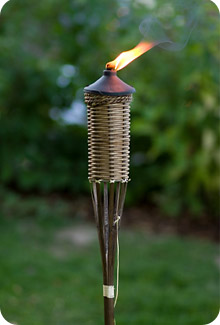Backyard and outdoor safety
Many Canadians spend a lot of their time doing yard work and relaxing outdoors in their backyards during the warmer months. Find out how to enjoy the outdoors around your home safely.
On this page
- Yard work safety tips
- Lawnmowers
- Outdoor torches and fuels
- Portable fireplaces, firepots and pourable fuels
- Fuel-burning portable generators
- Barbecue safety
- For more information
Yard work safety tips
When doing yard work, it is important to know how to safely use your power tools and equipment. You can avoid injury by properly maintaining and using these items.
- Read, understand and follow the manufacturer's instructions before using a power tool. Equipment should only be used for its intended purpose.
- Inspect equipment before use to make sure that it is in good working order and safety guards are in place.
- Remove rocks, sticks, toys and tools from the lawn before using power equipment.
- Before plugging in any power equipment, make sure the power switch is turned off.
- Never operate power tools with frayed cords.
- Never operate power tools during wet conditions as there is potential for electric shock.
Lawnmowers
- Keep children away from the mowing area and never allow them to operate or ride a lawnmower.
- Never mow or use electrical equipment in wet conditions. A lawnmower can overturn on a slope or wet grass.
- If the blades of a power lawnmower become clogged, turn off or unplug the machine before clearing it. Use a stick or other tool to remove the clogged debris to avoid being injured in case the blades complete a rotation after clearing.
- Injuries can be caused by falls from ride-on lawnmowers. Most mowers are designed for only a single operator; never operate a ride-on mower with more riders than recommended by the manufacturer.
- Always consult your machine's operating manual and warnings for information on how to work safely on a slope. For walk-behind lawnmowers, mow across the face of slopes, not up and down.
- For ride-on lawnmowers, the type of machine will determine the direction in which you should operate on a slope.
- For ride-on lawnmowers, consult your machine's operating manual for the maximum slope for safe operation. Do not stop or start on a slope, do not turn the machine on a slope, and use a slow speed and low gear.
Wear protective gear
Always wear protective gear when using power tools, such as:
- closed-toe shoes
- work boots
- safety glasses
- hearing protection
Loud noise from power garden equipment can gradually cause permanent hearing loss and the inability to hear warning sounds.
Only use gloves with power tools if recommended by the manufacturer's instructions. Gloves can pose a hazard when used with some power tools, particularly those with spinning parts.
Outdoor torches and fuels

Decorative, refillable outdoor torches are great to sit by on a warm summer night. However, they can pose flammability and toxicity hazards to you and your children.
- Flammability
- Even when used correctly, lit torches are an open flame source.
- Never leave a burning torch or candle unattended.
- Do not use torches near anything that can catch fire, including flammable decorations, compostable materials, and clothing.
- Toxicity
- When a torch or other liquid fuel carries toxicity warnings, swallowing the contents can cause severe health effects or death.
- Keep fuel containers in a well-ventilated area, out of the sight and reach of children.
Tips for safe use
- Teach your children that these products are not toys.
- Store products according to their label instructions.
- Always read the label of any chemical product before using it.
Portable fireplaces, firepots and pourable fuels

Portable fireplaces and firepots that use pourable liquid or gel fuels are becoming popular backyard items. While the flames may seem less intense or more controlled than traditional wood burning fires, there are serious risks to using these products. Some key safety considerations are outlined on Health Canada's Portable fireplaces, firepots and pourable fuels safety web page.
Fuel-burning portable generators
Fuel-burning portable generators are a common source of power during a power outage, including those caused by severe weather events. These products can pose a serious risk to health or safety if not used properly.
Fuel-burning portable generators produce carbon monoxide, which has no smell or colour and can cause symptoms like headaches, shortness of breath, fatigue, and death.
You can reduce your family's risk of illness, injury, or death by following these safety tips:
- Do not use a fuel-burning portable generator indoors or in partly enclosed spaces, whether at home, at the cottage, or in your garage, even during an emergency.
- Keep fuel-burning portable generators at least 6 metres away from your home and its doors, windows and vents, when in use to help prevent carbon monoxide from entering your home.
- Stop your fuel-burning portable generator and let it cool before you refuel it to reduce the risk of a fire.
- Choose fuel-burning portable generators with a built-in sensor that triggers an automatic shut-off if carbon monoxide builds up to dangerous levels in an enclosed space.
- Always read and follow the manufacturer's instructions.
Check for product recalls and report any injuries or other product-related health and safety concerns.
Barbecue safety
Many Canadians love to barbecue all year-round, but especially when the weather starts to get warm. Find out how to use your barbecue safely.